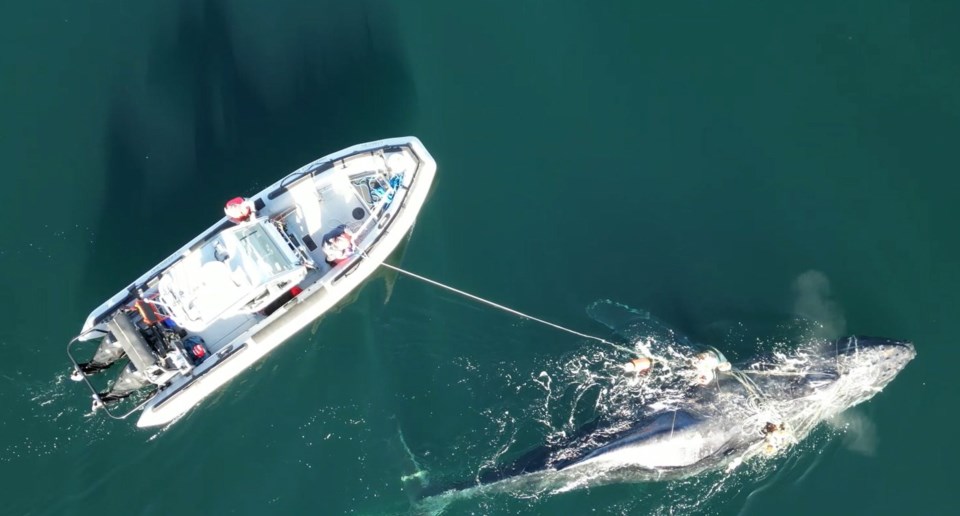A humpback whale was so entangled in fishing gear, ropes and buoys that it took four days for a Fisheries Department crew to unravel the mess.
Paul Cottrell, a marine mammal co-ordinator with the department, said the rescue off British Columbia's coast between Prince Rupert and Haida Gwaii was one of the longest he had experienced.
It was clear the whale had been trapped within the ropes for months, said Cottrell.
"We didn't even know how to start on this animal because it was so constricted. Its mouth was closed with two wraps around the head, and there were ropes through the mouth, around the body," said Cottrell.
He said the team had to make 50 cuts to get the ropes and gear off.
"This poor animal was showing evidence of being exhausted and hadn't been feeding for quite a while," said Cottrell, adding that the gear they removed came from Canada and the United States, indicating the long journey the whale had taken while wrapped in fishing gear.
Cottrell said there's been "a real uptick in entanglements" like this one off B.C.'s coast, which he suspects is related to an influx of humpback whales in the area.
Whale conservation groups are calling for more training and equipment outside of the Department of Fisheries to allow others to help save the animals.
Cottrell said his team was in the Prince Rupert area on Sept. 3 doing a necropsy on a fin whale, when they got the call alerting them about an entangled whale in Hecate Strait.
When they found the whale, estimated to be about 10-metres long, it was "in very poor shape" and hardly able to get to the surface and breathe, said Cottrell.
He said the whale showed a burst of energy after being released, but it suffered many injuries so they'll be watching the health of the animal.
Cottrell said his team has been running non-stop this summer, dealing with at least one entanglement a week.
Janie Wray, CEO of North Coast Cetacean Society, said northern B.C. has historically been a “hot spot” for humpbacks, where researchers sometimes meet 30 to 40 such whales foraging.
The society has been conducting a study, using drones and photography, to determine how many whales in the area have been entangled looking for scars from fishing gear.
One of their drones caught a photo of a whale with a long rope attached to its pectoral fin in 2022 and they reported it to the DFO immediately, Wray said.
She said she was relieved to see the same whale had survived when it revisited in 2023.
Jackie Hildering, a humpback researcher for the Marine Education and Research Society based out of Port McNeill, B.C., said many of the entanglements are never documented, the whales are never detected and therefore can't be saved.
Hildering said their preliminary research shows that "50 per cent of humpbacks in B.C. have scarring left from being entangled."
It's unclear how many humpbacks have died, she said.
One example of such entanglements is a humpback they've called Catalyst that whale watchers have seen without a tail near B.C.'s Discovery Islands.
Catalyst's entanglement around its tail was never documented, she said, raising questions about how many others die and sink to the bottom of the ocean without discovery.
Wray has also heard about Catalyst's story and said they haven't seen it since July 22.
She said more resources need to be added to saving these whales, and that means more teams in the water unravelling the animals.
Wray said she worries that if Cottrell retires in 10 years, there won't be anyone left to do the work, "so other people need to be trained and know how to disentangle a whale."
This report by The Canadian Press was first published Sept. 13, 2024.
Nono Shen, The Canadian Press
